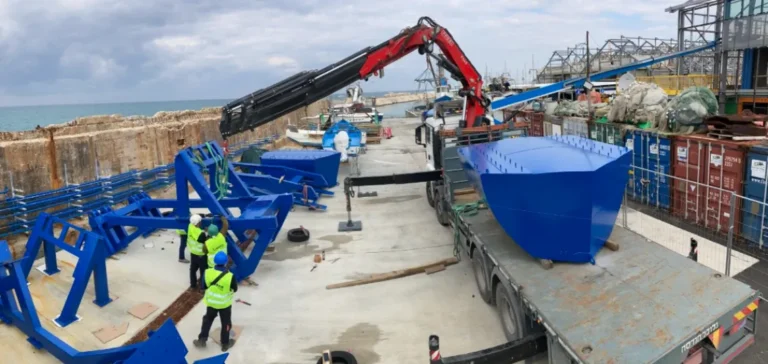Eco Wave Power Global AB, a company specializing in wave energy, has set the official launch date of the first U.S. pilot wave energy project in partnership with AltaSea at the Port of Los Angeles. The public event will be held on September 9, 2025, on-site at AltaSea, bringing together various stakeholders from energy, government, academia, and media sectors around this new energy installation.
A strategic technological project
The project uses Eco Wave Power’s patented technology consisting of floaters attached to existing port infrastructure. These floaters convert the natural movement of waves into electricity through land-based conversion units. This type of installation is designed to provide a reliable and scalable solution, tailored to the energy needs of coastal cities. The first three floaters, manufactured locally by All-Ways Metal, a California-based, woman-owned business, are currently in their final painting and preparation phase.
The strategic meeting bringing together Inna Braverman, founder and CEO of Eco Wave Power, Ran Atias, vice-president of engineering, and Terry Tamminen, CEO of AltaSea, allowed finalization of the project schedule and technical details. Following this meeting, the teams conducted a joint site visit to ensure optimal coordination between manufacturing, installation, and logistics organization for the inaugural event.
Local and international support
Shell’s marine renewable energy development program is providing financial backing for this initiative. AltaSea, an organization founded to accelerate ocean-based solutions to climate challenges, is hosting this installation, highlighting the strategic importance of its location at the Port of Los Angeles.
“AltaSea was created to accelerate ocean solutions in response to climate change. Eco Wave Power perfectly embodies this vision becoming reality,” said Terry Tamminen, CEO of AltaSea.
Inna Braverman emphasized the local dimension of the production and technological innovation implemented: “We’re not simply making history, we’re making it locally, with Californian innovation, U.S.-based production, and world-class international collaboration.”
This pilot project represents a first in the United States for land-based wave energy. It could serve as a model for other international ports that may adopt this type of installation to diversify their electricity production.






















